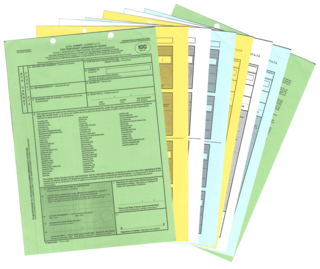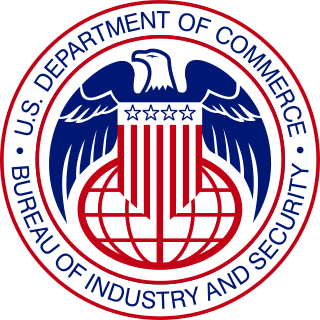 W
WThe Animal and Plant Health Inspection Service (APHIS) is an agency of the United States Department of Agriculture (USDA) based in Riverdale, Maryland responsible for protecting animal health, animal welfare, and plant health. APHIS is the lead agency for collaboration with other agencies to protect U.S. agriculture from invasive pests and diseases. APHIS is the National Plant Protection Authority for the U.S. government, and the agency's head of veterinary services is Chief Veterinary Officer of the United States.
 W
WThe Arms Export Control Act of 1976 gives the President of the United States the authority to control the import and export of defense articles and defense services. The H.R. 13680 legislation was passed by the 94th Congressional session and enacted into law by the 38th President of the United States Gerald R. Ford on June 30, 1976.
 W
WThe ATA Carnet, often referred to as the "Passport for goods", is an international customs document that permits the tax-free and duty-free temporary export and import of nonperishable goods for up to one year. It consists of unified Customs declaration forms which are prepared ready to use at every border crossing point. It is a globally accepted guarantee for Customs duties and taxes which can replace security deposit required by each Customs authorities. It can be used in multiple countries in multiple trips up to its one-year validity. The acronym ATA is a combination of French and English terms "Admission Temporaire/Temporary Admission." The ATA carnet is now the document most widely used by the business community for international operations involving temporary admission of goods.
 W
WThe Bureau of Industry and Security (BIS) is an agency of the United States Department of Commerce that deals with issues involving national security and high technology. A principal goal for the bureau is helping stop the proliferation of weapons of mass destruction, while furthering the growth of United States exports. The Bureau is led by the Under Secretary of Commerce for Industry and Security.
 W
WIn Russia, a Certificate of Conformity, also called a Quality Certificate, Safety Certificate or Customs Certificate, affirms that a product or service conforms to legal safety and quality requirements. There are two types of certificate: one demonstrates conformity to the national standards known as GOST, and the other to a particular technical regulation. Certification may take place on either a mandatory or a voluntary basis. The certificate may be obtained: under contract; per consignment; or for serial production of commercial products.
 W
WCustoms is an authority or agency in a country responsible for collecting tariffs and for controlling the flow of goods, including animals, transports, personal effects, and hazardous items, into and out of a country. Traditionally, customs has been considered as the fiscal subject that charges customs duties and other taxes on import and export. In recent decades, the views on the functions of customs have considerably expanded and now covers three basic issues: taxation, security, and trade facilitation.
 W
WIn product development, an end user is a person who ultimately uses or is intended to ultimately use a product. The end user stands in contrast to users who support or maintain the product, such as sysops, system administrators, database administrators, information technology experts, software professionals and computer technicians. End users typically do not possess the technical understanding or skill of the product designers, a fact easily overlooked and forgotten by designers: leading to features creating low customer satisfaction. In information technology, end users are not "customers" in the usual sense—they are typically employees of the customer. For example, if a large retail corporation buys a software package for its employees to use, even though the large retail corporation was the "customer" which purchased the software, the end users are the employees of the company, who will use the software at work.
 W
WThe Federal Service for Military-Technical Cooperation is a Russian government service regulating Military-Technical Cooperation issues. The service reports to the President, and is subject to jurisdiction of the Ministry of Defense. The organizational structure consists of the Central Office and its representative offices in foreign states.
 W
WThe Japanese Arms Export Ban, known as the Three Arms Exports Ban, is a de facto law that governs Japanese export of military hardware outside of the country.
 W
WThe Office of Foreign Assets Control (OFAC) is a financial intelligence and enforcement agency of the U.S. Treasury Department. It administers and enforces economic and trade sanctions in support of U.S. national security and foreign policy objectives. Under Presidential national emergency powers, OFAC carries out its activities against foreign states as well as a variety of other organizations and individuals, like terrorist groups, deemed to be a threat to U.S. national security.
 W
WIn January 1814 Governor Miles MacDonell, appointed by Thomas Douglas, 5th Earl of Selkirk issued to the inhabitants of the Red River area a proclamation which became known as the Pemmican Proclamation. The proclamation was issued in attempt to stop the Métis people from exporting pemmican out of the Red River district. Cuthbert Grant, leader of the Métis, disregarded MacDonell's proclamation and continued the exportation of pemmican to the North West Company. The proclamation overall, became one of many areas of conflict between the Métis and the Red River settlers. Thomas Douglas, 5th Earl of Selkirk had sought interest in the Red River District, with the help of the Hudson's Bay Company as early as 1807. However, it was not until 1810 that the Hudson's Bay Company asked Lord Selkirk for his plans on settling in the interior of Canada.
 W
WThe Wassenaar Arrangement on Export Controls for Conventional Arms and Dual-Use Goods and Technologies is a multilateral export control regime (MECR) with 42 participating states including many former Comecon countries.